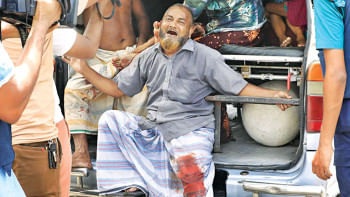How Bangladeshis of all faiths can build mutual trust

The recent killing of a Muslim lawyer in Chattogram, allegedly by deviant supporters of Chinmoy Krishna Das Brahmachari, a former leader of International Society for Krishna Consciousness (ISKCON), has reignited discussions about interfaith relations in Bangladesh. While the act was committed by individuals, its implications reverberate across the broader fabric of our society. It is, therefore, essential to scrutinise the responsibilities of both "majority" and "minority" communities within the ethical and philosophical framework of coexistence—not as a way to apportion blame, but to illuminate the path towards mutual trust and harmony.
In a nation where Muslims form the overwhelming majority, the responsibility to protect and respect minorities is both a moral and political imperative for them. However, this perspective often overlooks a crucial philosophical question: what are the reciprocal responsibilities of the minorities in a shared society? Cultivating trust requires a joint effort grounded in mutual accountability. Although the Muslim majority bears the primary responsibility for safeguarding minorities, the Hindu community, despite being vulnerable to political exploitation and social marginalisation, holds a vital role in promoting a collective vision of coexistence that transcends religious identities. Addressing this sensitive issue demands thoughtful reflection on both historical and contemporary dynamics, as well as a candid exploration of shared responsibilities.
At the heart of this issue lies the notion of recognition. Philosopher Charles Taylor describes recognition as a vital human need, a mutual acknowledgment of dignity and value between individuals and groups. In our context, the Hindu community often finds itself subjected to "reductive identities" imposed from the outside: as pawns in political games, as an extension of Indian influence, or as a monolithic bloc aligned with a single political party. These narratives not only undermine the community's agency but also erode the trust that is foundational to social harmony.
The first step towards building trust is the rejection of such imposed identities. Hindus in Bangladesh must assert their individuality and diversity while resisting the temptation to align unquestioningly with any political faction or external power. This resistance is not merely pragmatic—it is an ethical stance against the instrumentalisation of identity. Political loyalty, like trust, must be distributed broadly and judiciously to avoid becoming a source of division.
Similarly, the perception of India as a "natural ally" or even a "saviour" of Bangladeshi Hindus requires critical reflection. While cultural and historical ties between the two neighbouring countries are undeniable, India is a foreign nation whose actions are guided by its own interests. Over-reliance on India risks alienating the Hindu community from the broader Bangladeshi populace and reinforces the narrative that they are not fully integrated members of the nation. From a philosophical standpoint, loyalty to one's homeland is not just a pragmatic necessity, but an ethical obligation as well. A minority community that reaffirms its belonging to the nation strengthens the social contract as well as the foundation for mutual trust.
This sense of loyalty can be further demonstrated by challenging external narratives, particularly those from India, that exaggerate or distort the reality of Hindu experiences in Bangladesh. Propaganda in Indian media about the persecution of Hindus in Bangladesh often paints a skewed picture that inflames tensions and mistrust. If Bangladeshi Hindus remain silent on such matters, they inadvertently reinforce suspicions within the majority Muslim population. By publicly rejecting exaggerations and urging balanced narratives, Hindus can showcase their commitment to truth and national unity.
Similarly, when the Indian government comments unduly on Bangladesh's internal matters, Hindus in Bangladesh can express their disapproval, affirming that they, too, are concerned about external interference in their sovereign nation. Bangladesh's restraint from commenting on the systemic discrimination of minorities in India reflects a commitment to the principle of non-interference, a value that Hindus—as equal stakeholders in the nation's sovereignty—can actively support and uphold. Such actions would not only counteract damaging narratives but also foster greater trust and solidarity with their Muslim compatriots.
However, trust is not a one-sided virtue. Both the majority Muslim population and the minority Hindu population must engage in self-reflection. Why is it that Hindus are often viewed with scepticism in ways that other minorities, such as Christians or Buddhists, are not? Is this mistrust rooted in historical grievances, political manipulation, or simply ignorance? These questions demand honest introspection and a willingness to confront uncomfortable truths. Trust, as the philosopher Onora O'Neill argues, is a fragile yet essential currency in human relationships. To build it, both parties must actively engage in practices of openness, fairness, and respect.
For the Hindu community, this means cultivating a sense of belonging that goes beyond mere coexistence. Philosophers like Hannah Arendt emphasise the importance of active participation in the public sphere as a means of claiming agency and recognition. Hindus in Bangladesh can engage in civic and cultural initiatives that emphasise shared national goals and values to create a narrative of unity that transcends religious divisions. By contributing visibly to the nation's social and cultural life, the community can challenge stereotypes and demonstrate its integral role in the country's development.
Equally important is the ethical responsibility to resist the manipulation of religious identity for political gain. The poor and vulnerable within the Hindu community often suffer the most when religious identity becomes a tool for division. This is not a challenge unique to Hindus; it reflects a broader pattern in which the powerful exploit differences for their own ends. Philosopher Iris Marion Young speaks of "structural injustice" where systems perpetuate inequality not through direct acts of oppression, but through the cumulative effects of exploitation and marginalisation. Hindus, along with other communities, must actively resist these structures by advocating for policies and practices that promote justice and equity for all.
The philosophical imperative of trust extends beyond individual actions or community efforts. It is a collective project that demands a reimagining of Bangladesh's pluralistic identity. Trust is not built on silence or avoidance of differences—it requires a shared commitment to ethical principles that prioritise human dignity and shared belonging over sectarian divides. This requires a shift in perspective, where the Hindu community is not seen as merely a minority to be protected, but as an equal partner in shaping the nation's future.
At its core, the challenge facing Bangladesh is not just about interfaith relations; it is also about navigating the complexities of living together in a world of diversity. Trust, as a virtue, is both fragile and transformative. It requires the courage to extend goodwill without guarantees, and the humility to recognise the limits of one's own perspective. For both Muslims and Hindus in Bangladesh, this means embracing a vision of coexistence that is not merely pragmatic but profoundly ethical.
In this vision, trust is not a gift bestowed by the majority, nor a demand made by the minority. It is a shared responsibility, built through dialogue, recognition and a collective commitment to justice. Only by embracing this collective responsibility can Bangladesh fulfil its promise as a nation united in its diversity.
Dr Kazi ASM Nurul Huda is associate professor of philosophy at the University of Dhaka. He can be reached at [email protected].
Views expressed in this article are the author's own.
Follow The Daily Star Opinion on Facebook for the latest opinions, commentaries and analyses by experts and professionals. To contribute your article or letter to The Daily Star Opinion, see our guidelines for submission.

 For all latest news, follow The Daily Star's Google News channel.
For all latest news, follow The Daily Star's Google News channel. 










Comments